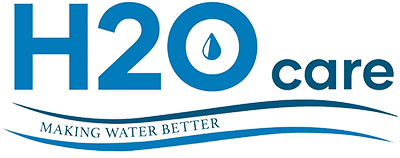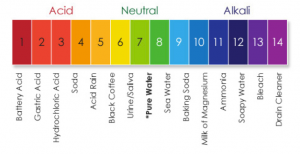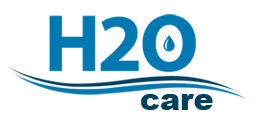Most wells in New England require some type of water filtration or water softening to remove either aesthetically undesirable minerals or health threat contaminants. Later in this write-up, specific contaminants that are commonly found in Sherborn private wells are identified and effective remediation methods are covered. Excellent water quality is achievable with the proper approach.
WATER TESTING & ANALYSIS
If you have a private well, water testing should be conducted by an EPA or Massachusetts state certified laboratory and should include analysis for at least the parameters in the table below. Depending on your specific situation, additional testing may be required. If you are uncertain about what to test for or how to take a proper sample and get it to a lab, you should contact a lab or water treatment professional for assistance. They can walk you through the steps required to complete this task. Typical items tested for at a lab are as follows:
| Coliform bacteria | pH |
| Arsenic | Radon |
| Chloride | Sodium |
| Iron | Sulfate |
| Lead | Conductivity |
| Manganese | Nitrogen-Nitrate |
| Hardness | Total Dissolved Solids |
COMMONLY FOUND CONTAMINANTS REQUIRING WATER FILTRATION
Common issues encountered in Sherborn private wells are manganese and iron along with low pH and sometimes the health threats radon and arsenic making their way into the water. Hydrogen Sulfide is evidenced typically by a rotten egg smell in water, however this may be caused by high Manganese levels in the water as well. See the following link for a table of Symptoms, Problems & Solutions at Common Regional Water Problems.
BAD ODORS & TASTE IN WATER
There are many other types of systems to remove bad tastes & odors, sediment and many other objectionable minerals and contaminants in the water. There are “point of entry” systems that will provide filtration for all of the water entering your home or facility. Also, there are “point of use” water filtration systems that will provide filtered water at a sink or other single point of use, typically by feeding the filtered water to a designated, separate faucet. For more on bad odors & taste in your water, see the link at https://h2ocare.com/bad-odor-taste.
WATER FILTRATION & WATER SOFTENER SYSTEMS
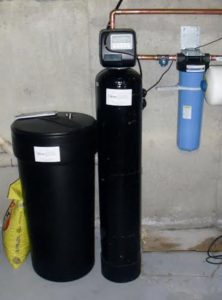
Water Softener with Sediment Filtration
Water softeners are typically installed to remove the hard water minerals calcium and magnesium, as well as dissolved iron or manganese through a technology called Ion Exchange. Particulate iron or manganese (which you can see in the water) can be removed with a properly sized sediment filtration set up. Other types of water filtration systems may be required to remove some of the other contaminants identified in the water testing section above. For more information on manganese in water, see the article at the following link Manganese in Water Article in Water Technology For more information on Iron in Water, see the article link at Iron Article in Water Technology Magazine. Water filtration systems should be maintained at some regular interval to assure proper working function (with water testing). The proper intervals typically are annually but may vary depending on your situation.
HEALTH THREAT CONTAMINANTS – Arsenic & Radon in private wells
ARSENIC IN WATER
The Arsenic maximum allowable level in drinking water per the EPA is .01 mg/L (miligrams per liter) or 10 parts per billion. Arsenic removal is performed with a specific media that grabs the arsenic out of the water. For more information on this see the link at Arsenic article link.
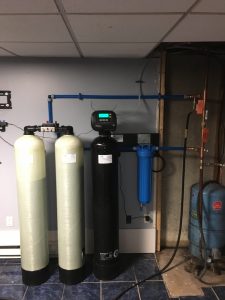
Twin Arsenic system with Ozone
RADON IN WATER
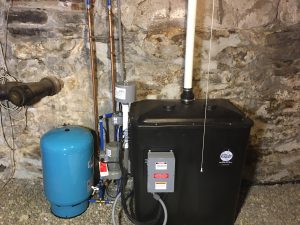
Radon in Water Removal System
The current Massachusetts radon remediation action level is at 10,000 pCi/L (Pico curries per liter) in water. The radon must be removed from the water and it is recommended testing the air for Radon as well. It should be noted that New Hampshire requires action if radon is only at 2,000 pCi/L. Maine and Rhode Island actionable levels are at 4,000 pCi/L. For more information on radon see the link at Radon in Water Article.Removing radon from water requires a system in which the water is agitated in a sealed chamber then vented to the outside, sending the radon gas safely out of the home. Other technologies and systems are used to remove other contaminants. Any water filtration system designed should start with a water test before an informed recommendation can be made
H2O Care is an established, Massachusetts based water filtration and testing firm, formed in 1989 with offices in Stow & Middleton, MA. Articles published by the Company can be seen in Water Technology Magazines at http://h2ocare.com/pub. Contact us at [email protected] or 800-539-1100.
